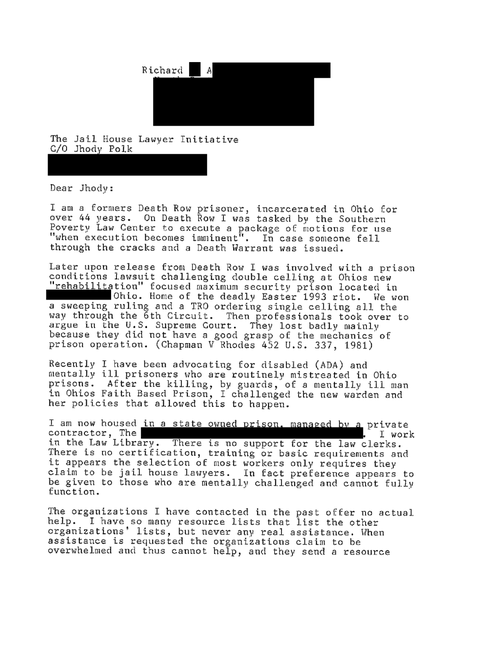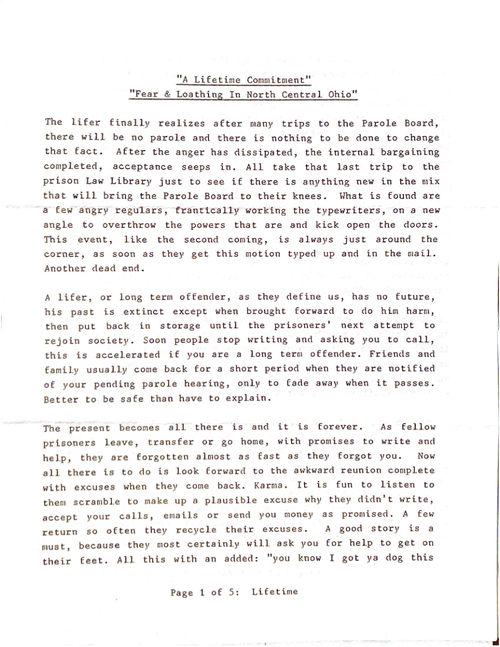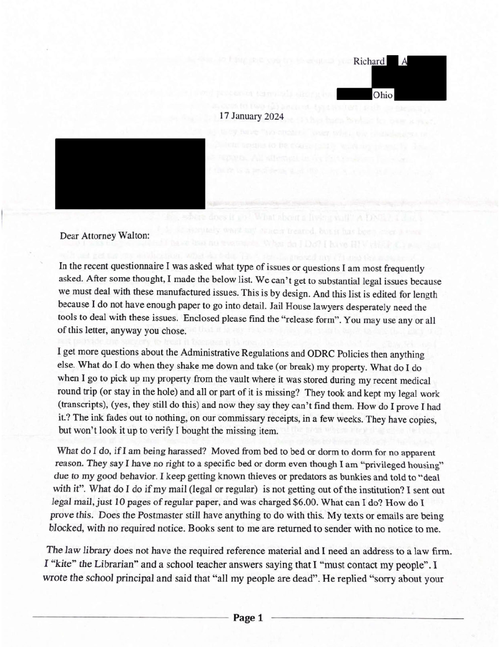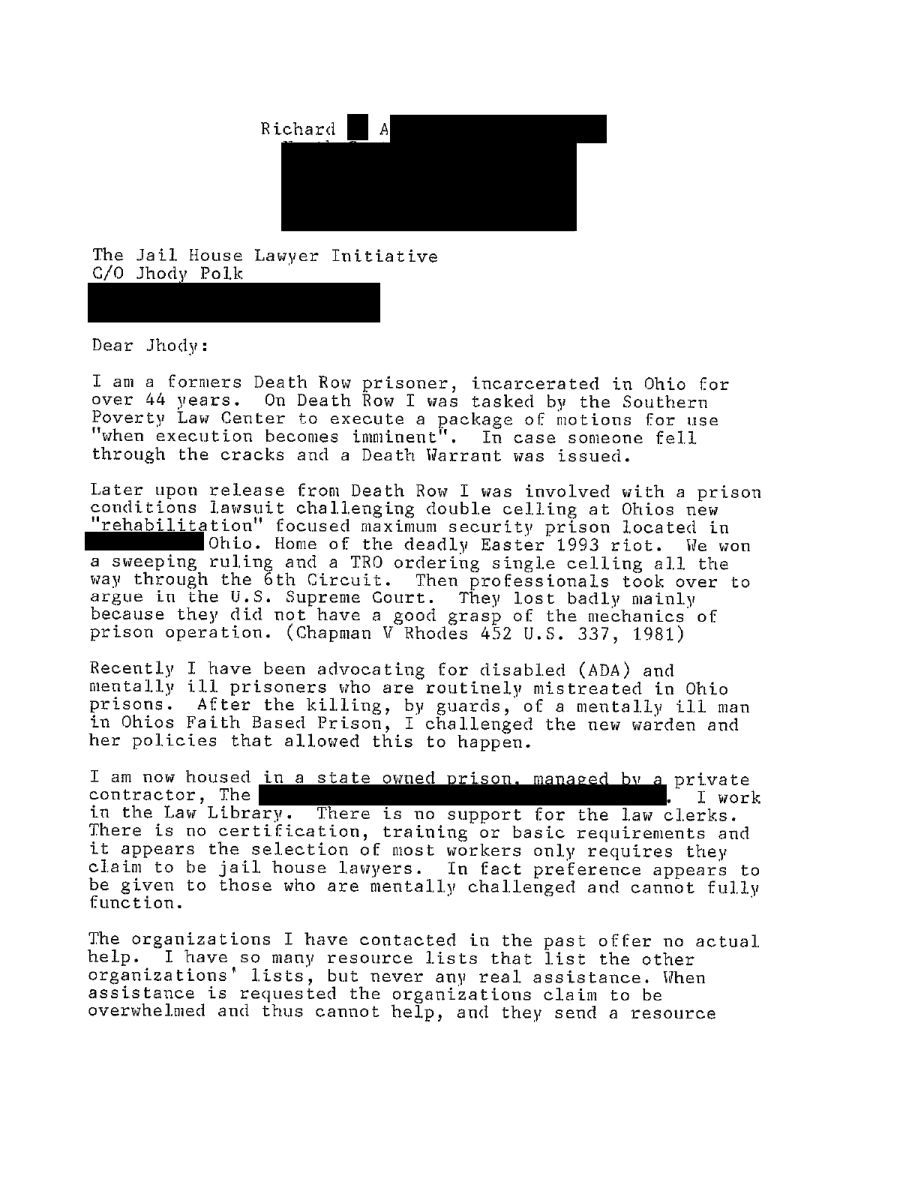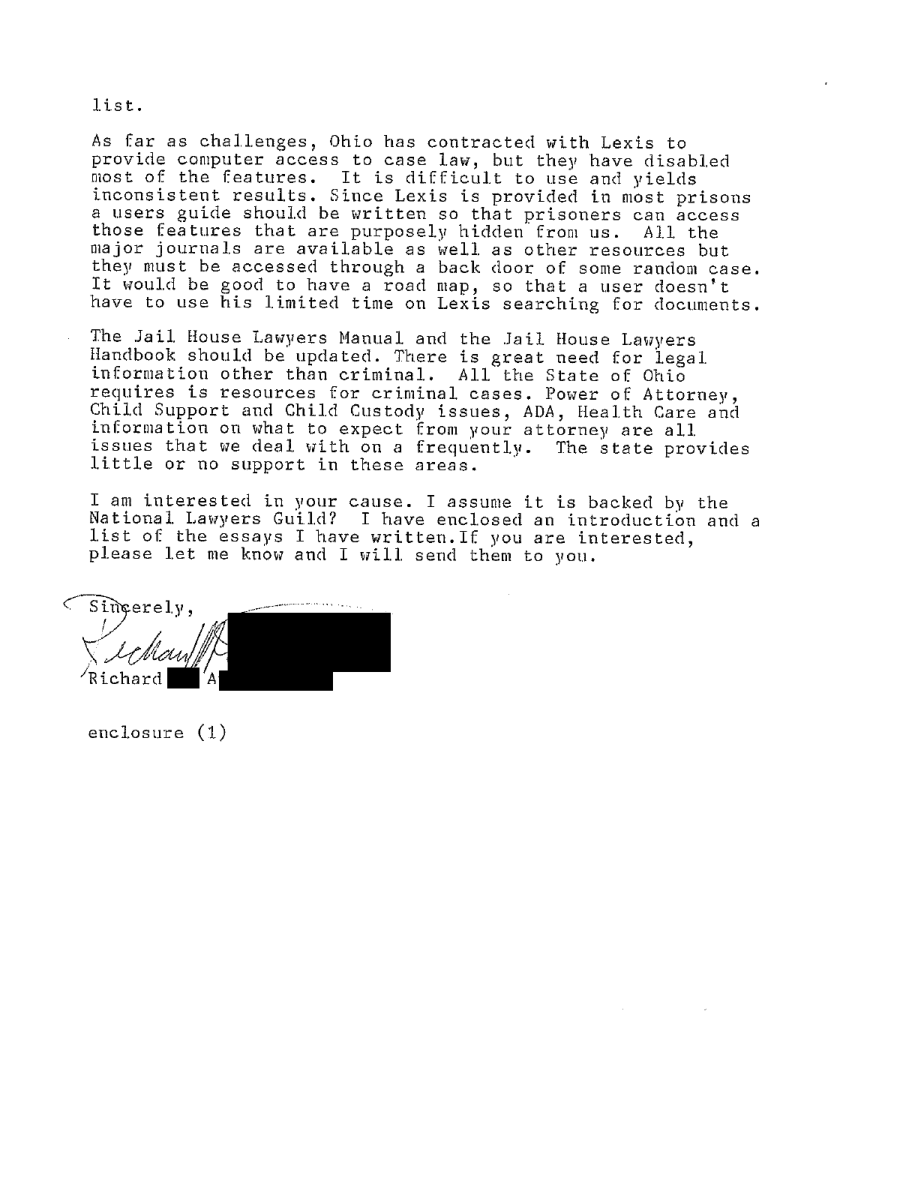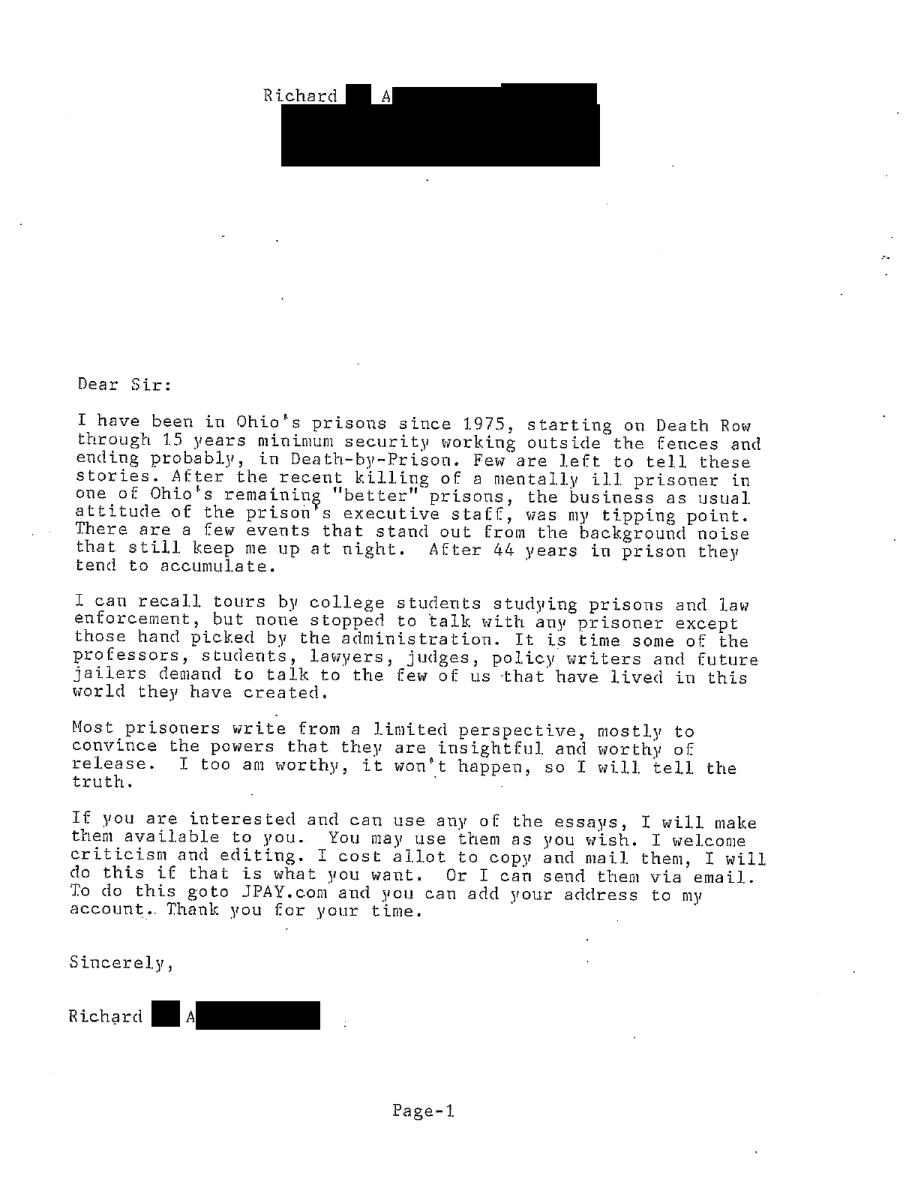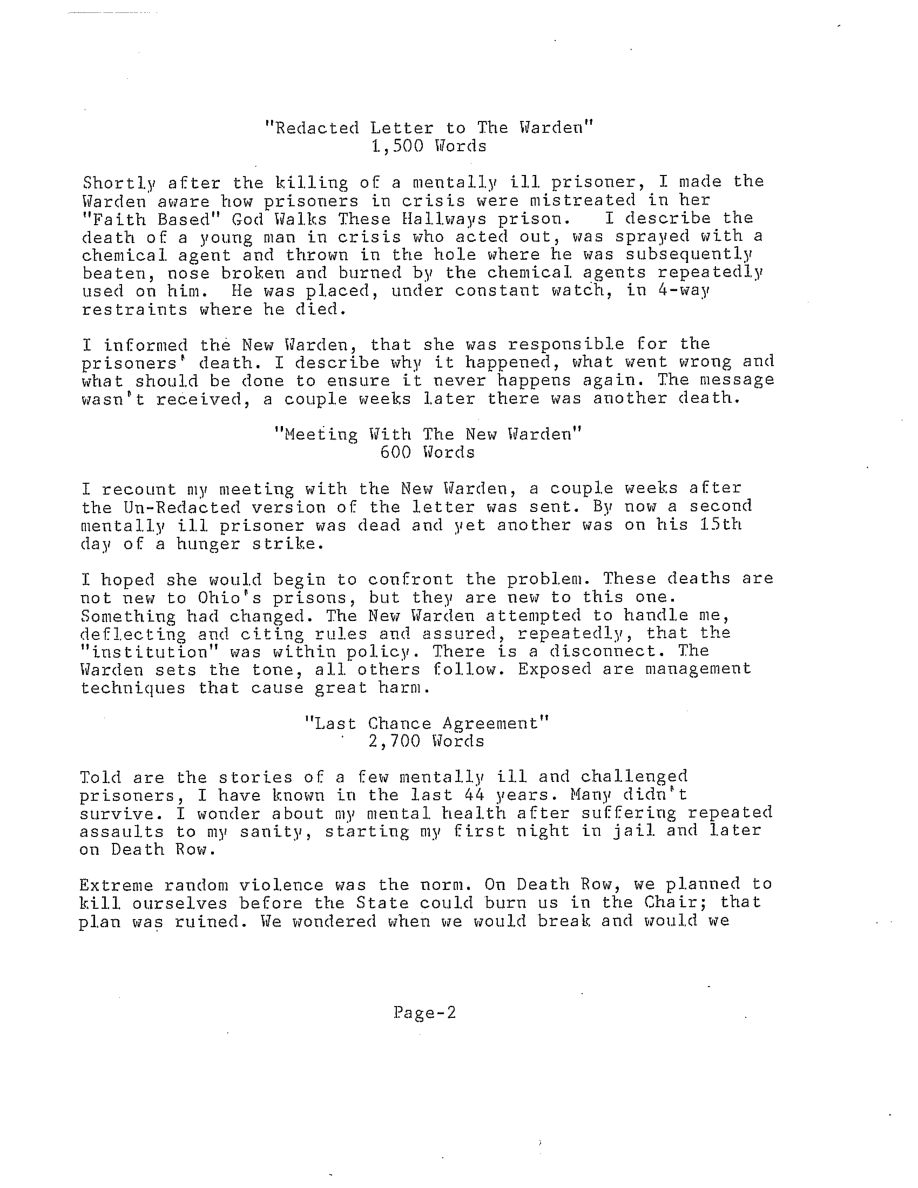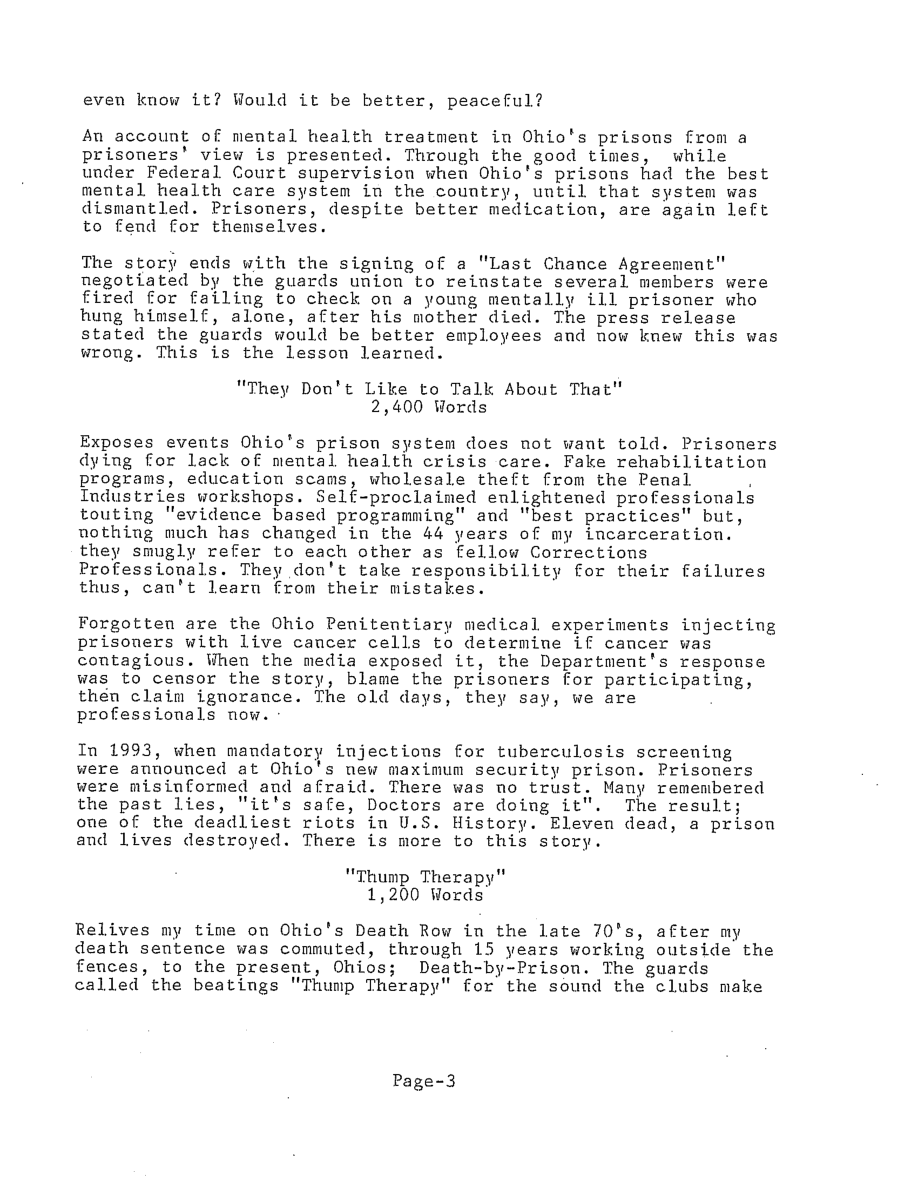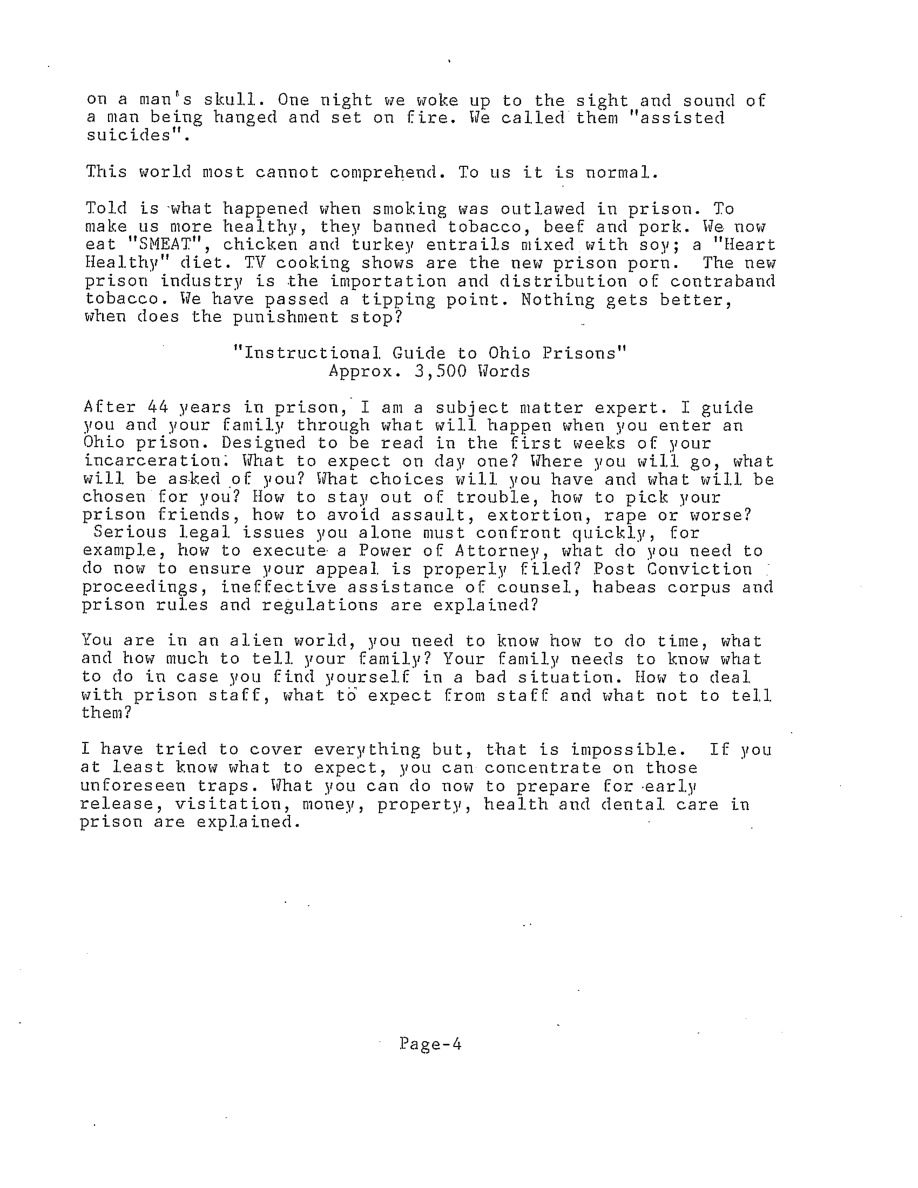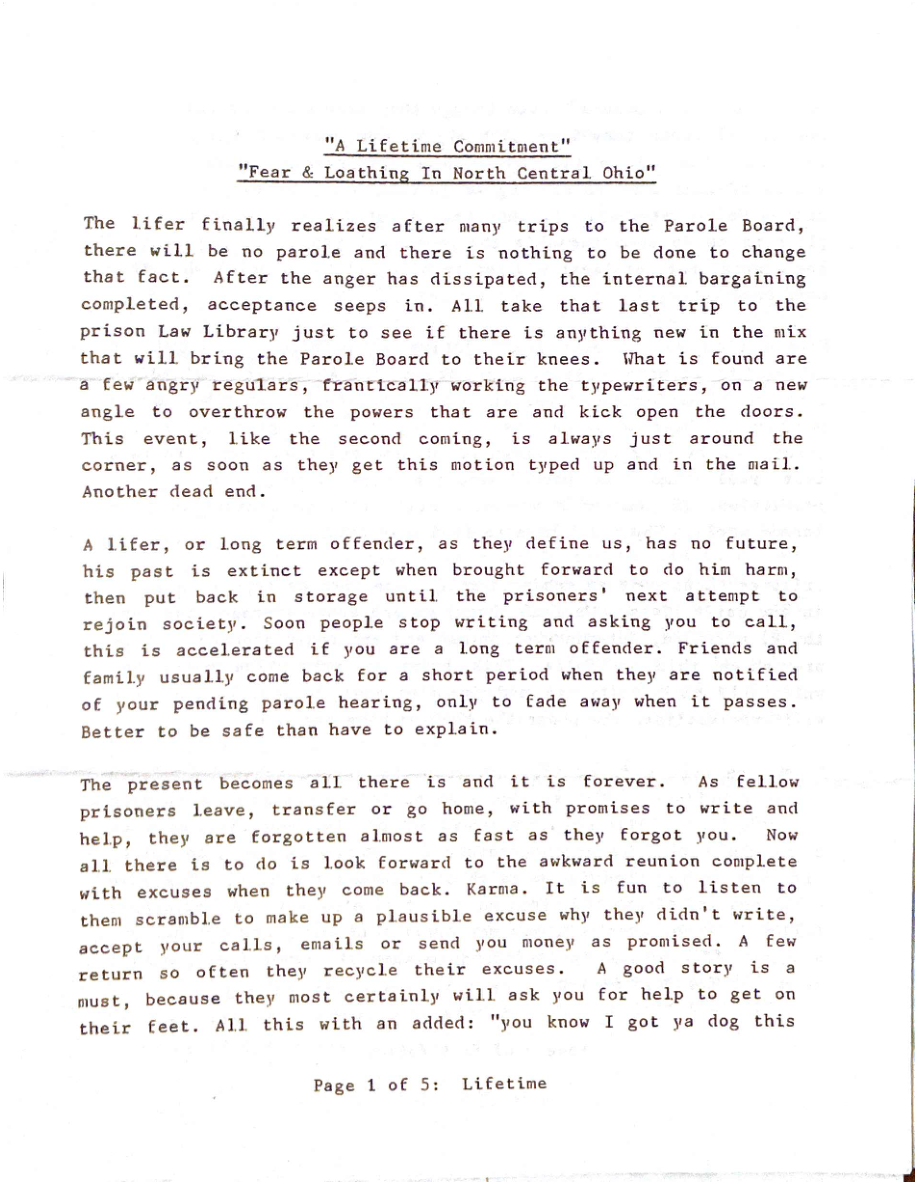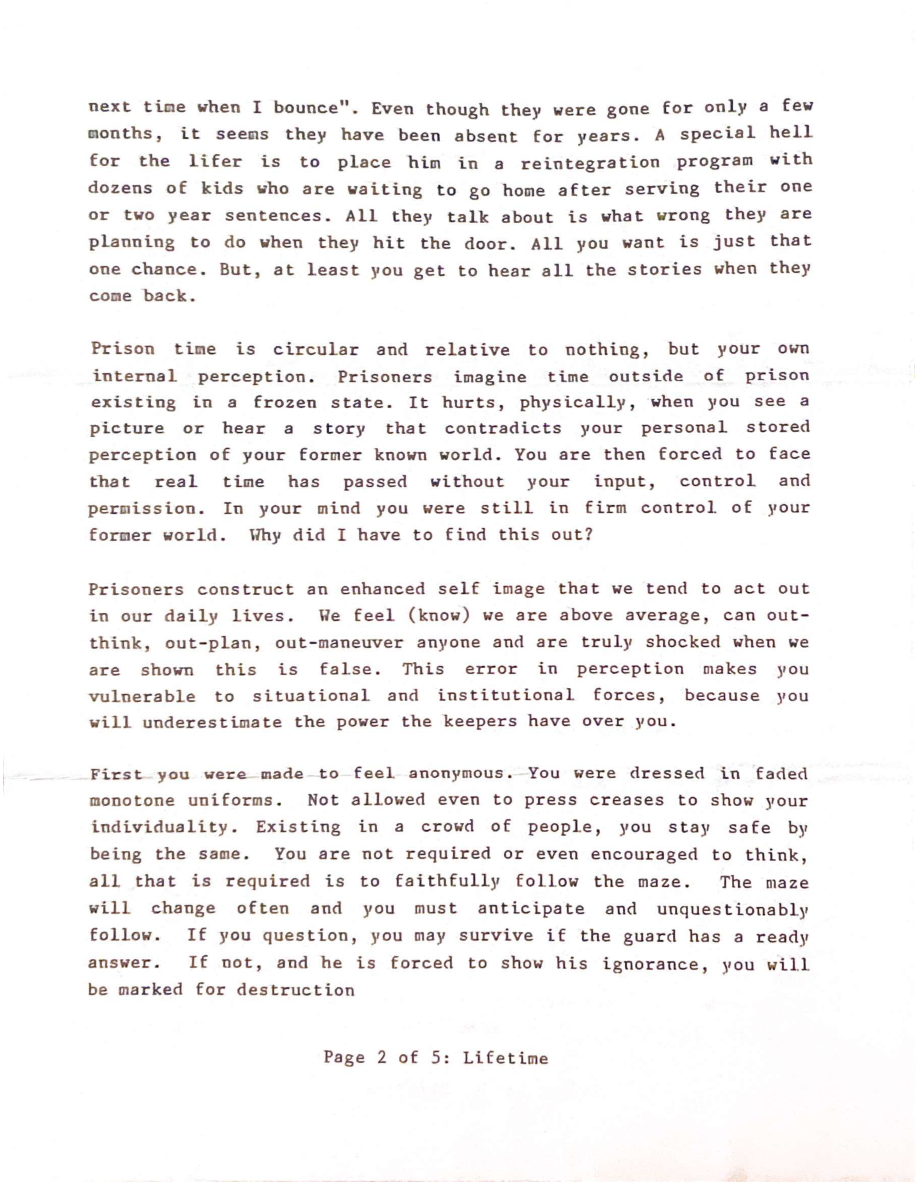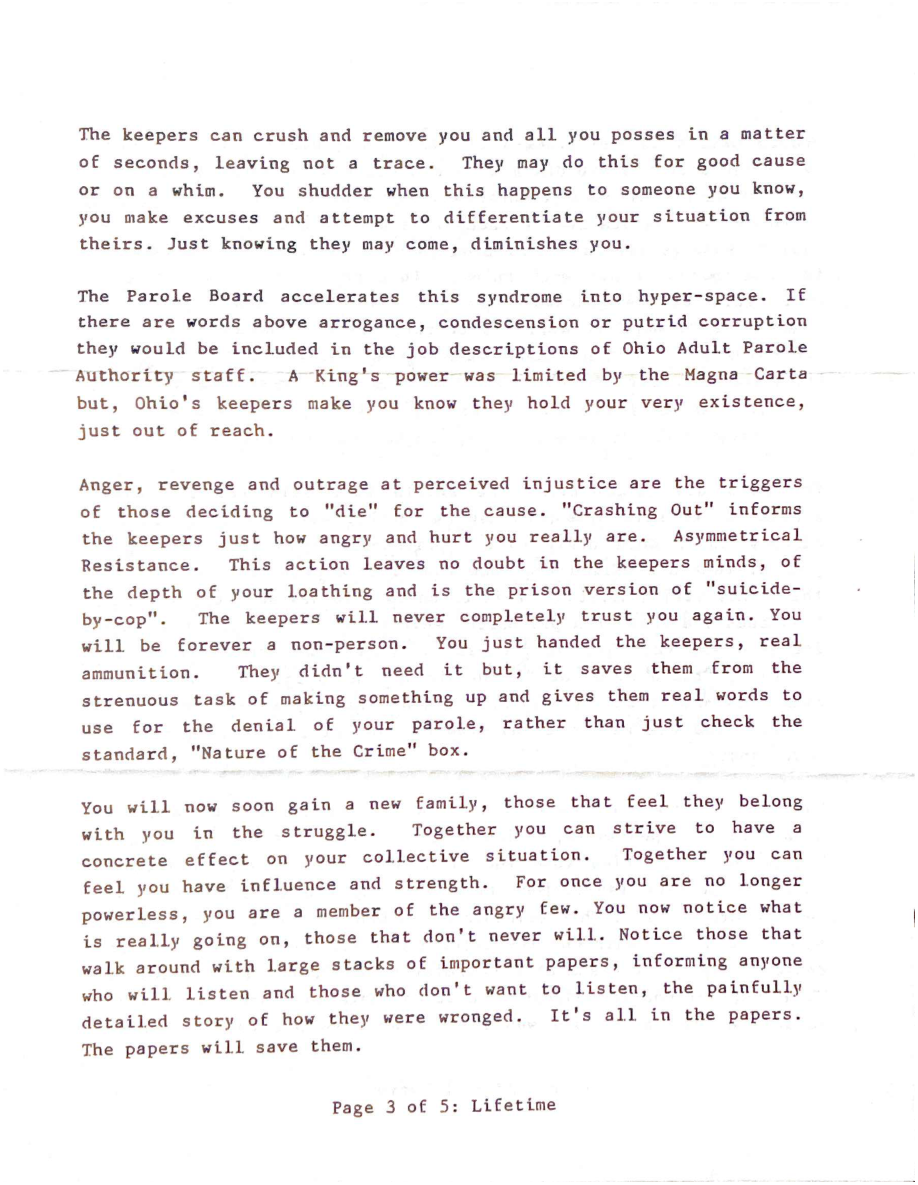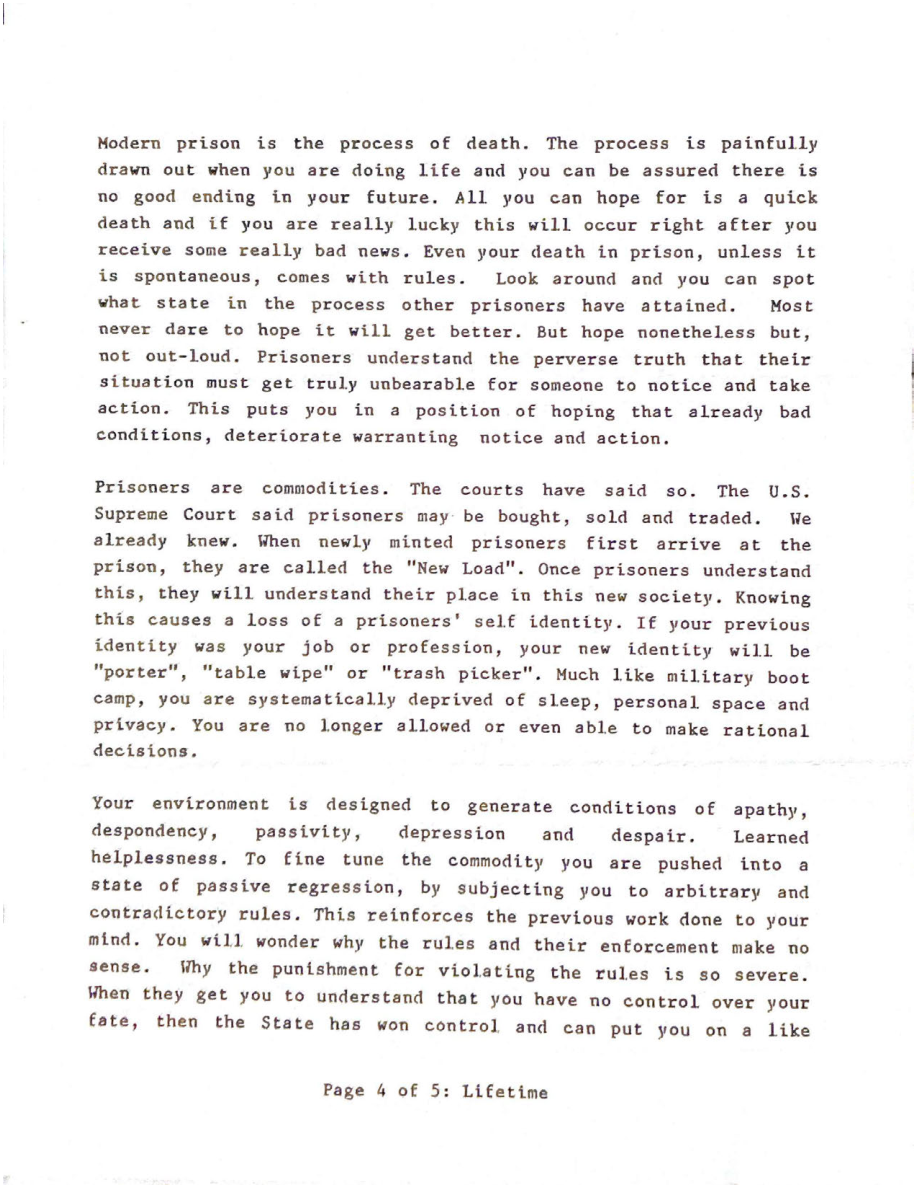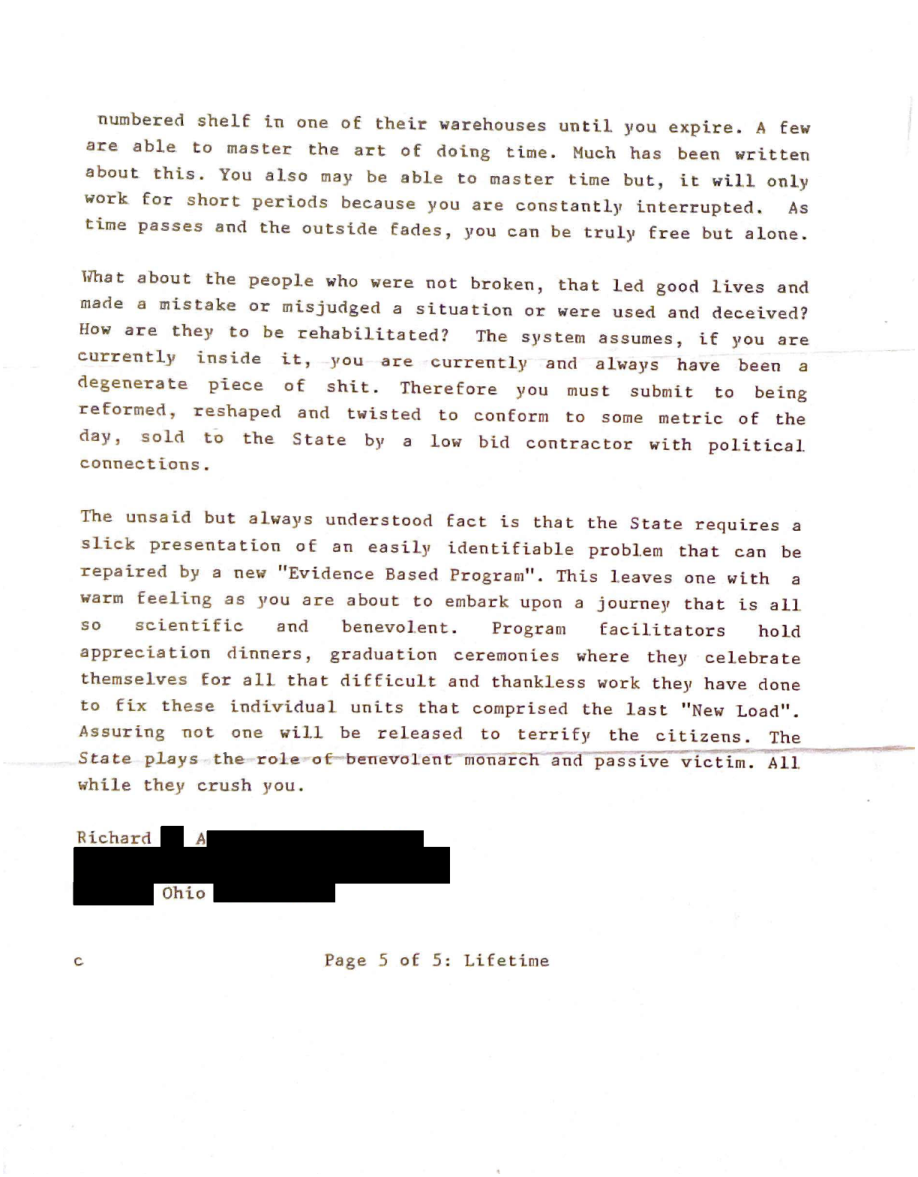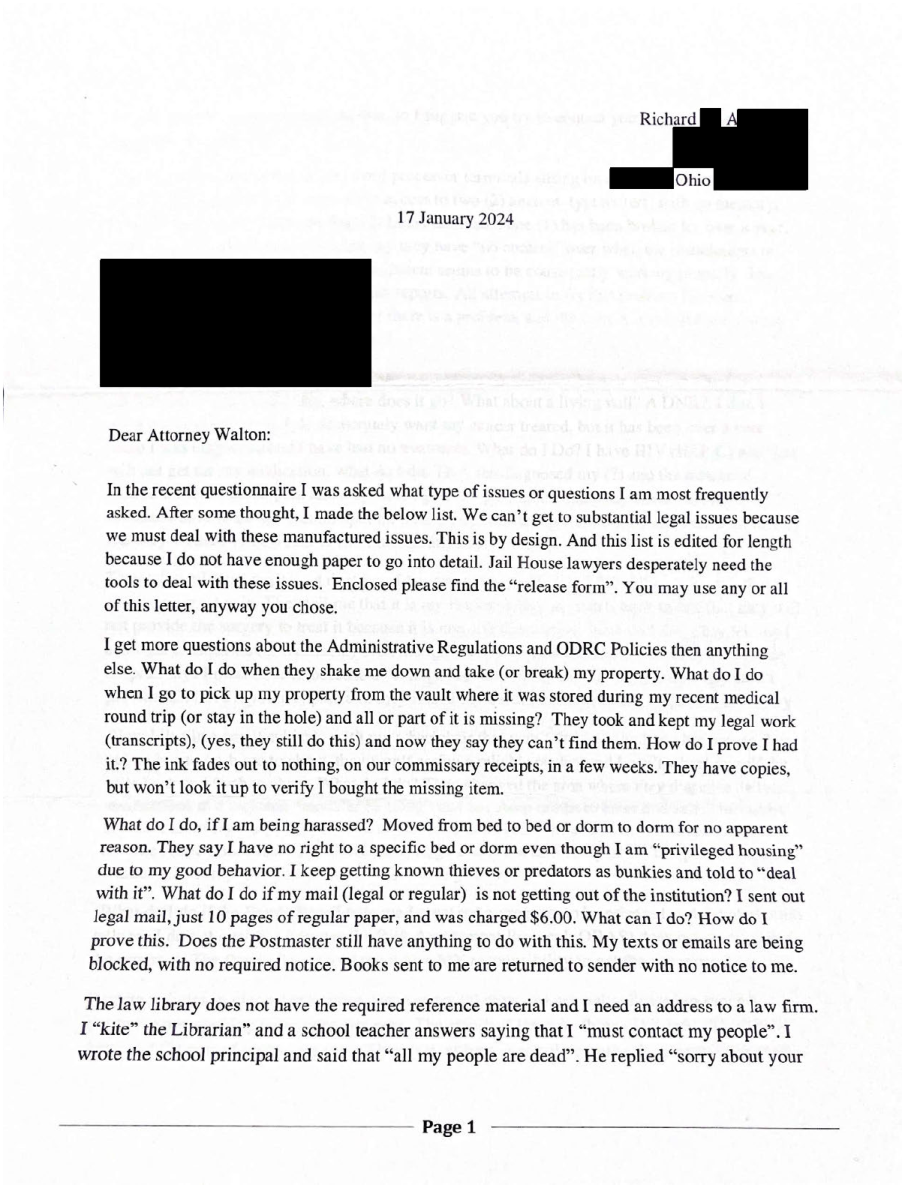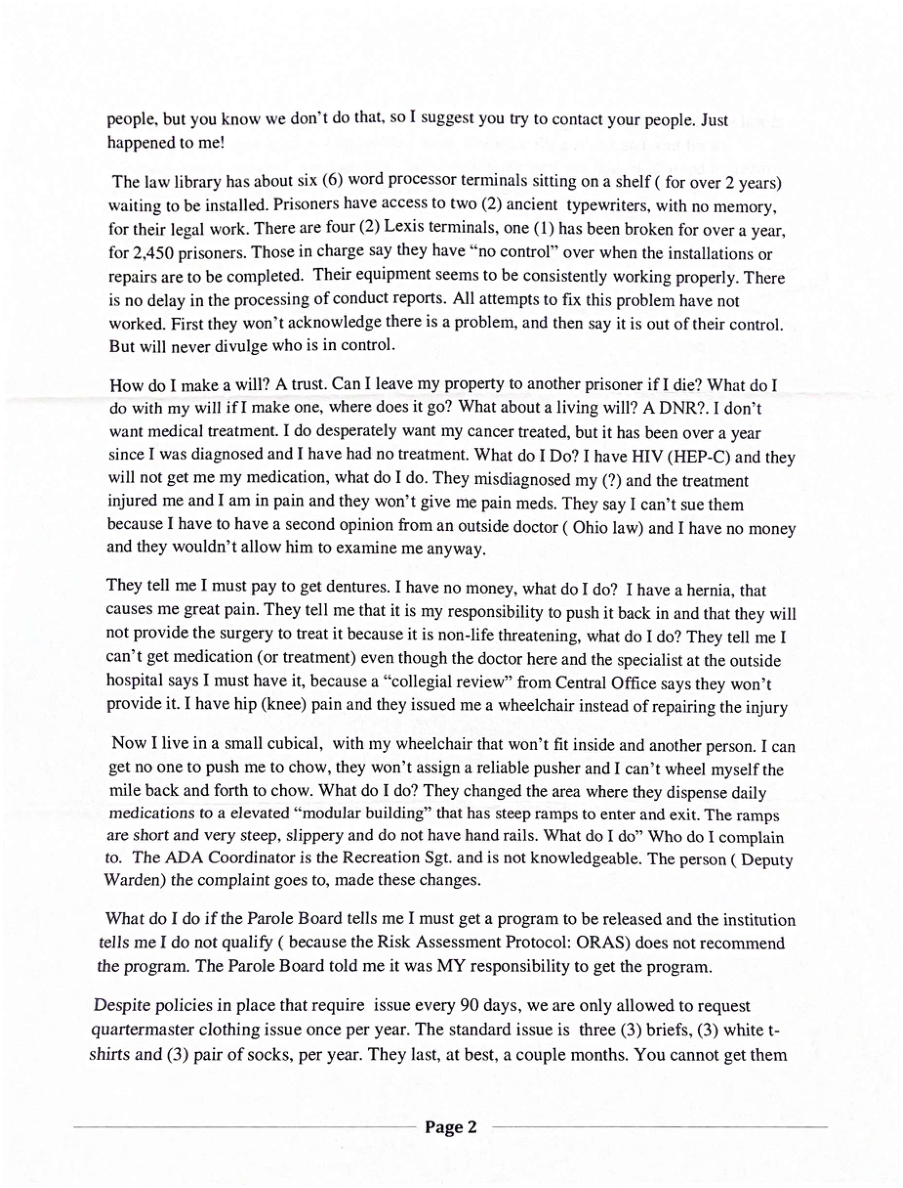Richard A.
I wish the world could read this letter so that they could know this:all letters
Richard A.
transcription
Richard A. [REDACTED]
The Jail House Lawyer Initiative
C/O Jhody Polk
[Redacted]
Dear Jhody:
I am a formers Death Row prisoner, incarcerated in Ohio for
over 44 years. On Death Row I was tasked by the Southern
Poverty Law Center to execute a package of motions for use
"when execution becomes imminent". In case someone fell
through the cracks and a Death Warrant was issued.
Later upon release from Death Row I was involved with a prison c
onditions lawsuit challenging double celling at Ohios new
"rehabilitation" focused maximum security prison located in
[Redacted] Ohio. Home of the deadly Easter 1993 riot. We won
a sweeping ruling and a TRO ordering single celling all the
way through the 6th Circuit. Then professionals took over to
argue in the U.S. Supreme Court. They lost badly mainly
because they did not have a good grasp of the mechanics of
prison operation. (Chapman V Rhodes 452 U.S. 337, 1981)
Recently I have been advocating for disabled (ADA) and
mentally ill prisoners who are routinely mistreated in Ohio
prisons. After the killing, by guards, of a mentally ill man
in Ohios Faith Based Prison, I challenged the new warden and
her policies that allowed this to happen.
I am now housed in a state owned prison, managed by a private
contractor, The [Redacted]. I work in the Law Library. There is no support for the law clerks.
There is no certification, training or basic requirements and
it appears the selection of most workers only requires they
claim to be jail house lawyers. In fact preference appears to
be given to those who are mentally challenged and cannot fully
function.
The organizations I have contacted in the past offer no actual
help. I have so many resource lists that list the other
organizations' lists, but never any real assistance. When
assistance is requested the organizations claim to be
overwhelmed and thus cannot help, and they send a resource
list.
As far as challenges, Ohio has contracted with Lexis to
provide computer access to case law, but they have disabled
most of the features. It is difficult to use and yields
inconsistent results. Since Lexis is provided in most prisons
a users guide should be written so that prisoners can access
those features that are purposely hidden from us. All the
major journals are available as well as other resources but
they must be accessed through a back door of some random case.
It would be good to have a road map, so that a user doesn't
have to use his limited time on Lexis searching for documents.
The Jail House Lawyers Manual and the Jail House Lawyers
Handbook should be updated. There is great need for legal
information other than criminal. All the State of Ohio
requires is resources for criminal cases. Power of Attorney,
Child Support and Child Custody issues, ADA, Health Care and
information on what to expect from your attorney are all
issues that we deal with on a frequently. The state provides
little or no support in these areas.
I am interested in your cause. I assume it is backed by the
National Lawyers Guild? I have enclosed an introduction and a
list of the essays I have written. If you are interested,
please let me know and I will send them to you.
Sincerely,
Richard A.
enclosure (1)
Richard A. [REDACTED]
Dear Sir:
I have been in Ohio's prisons since 1975, starting on Death Row
through 15 years minimum security working outside the fences and
ending probably, in Death-by-Prison. Few are left to tell these
stories. After the recent killing of a mentally ill prisoner in
one of Ohio's remaining "better" prisons, the business as usual
attitude of the prison's executive staff, was my tipping point.
There are a few events that stand out from the background noise
that still keep me up at night. After 44 years in prison they
tend to accumulate.
I can recall tours by college students studying prisons and law
enforcement, but none stopped to talk with any prisoner except
those hand picked by the administration. It is time some of the
professors, students, lawyers, judges, policy writers and future
jailers demand to talk to the few of us that have lived in this
world they have created.
Most prisoners write from a limited perspective, mostly to
convince the powers that they are insightful and worthy of
release. I too am worthy, it won't happen, so I will tell the
truth.
If you are interested and can use any of the essays, I will make
them available to you. You may use them as you wish. I welcome
criticism and editing. I cost allot to copy and mail them, I will
do this if that is what you want. Or I can send them via email.
To do this goto JPAY.com and you can add your address to my account. Thank you for your time.
Sincerely,
Richard A.
Page-1
"Redacted Letter to The Warden"
1,500 Words
Shortly after the killing of a mentally ill prisoner, I made the
Warden aware how prisoners in crisis were mistreated in her
"Faith Based" God Walks These Hallways prison. I describe the
death of a young man in crisis who acted out, was sprayed with a
chemical agent and thrown in the hole where he was subsequently
beaten, nose broken and burned by the chemical agents repeatedly
used on him. He was placed, under constant watch, in 4-way
restraints where he died.
I informed the New Warden, that she was responsible for the
prisoners' death. I describe why it happened, what went wrong and
what should be done to ensure it never happens again. The message
wasn't received, a couple weeks later there was another death.
"Meeting With The New Warden"
600 Words
I recount my meeting with the New Warden, a couple weeks after
the Un-Redacted version of the letter was sent. By now a second
mentally ill prisoner was dead and yet another was on his 15th
day of a hunger strike.
I hoped she would begin to confront the problem. These deaths are
not new to Ohio's prisons, but they are new to this one.
Something had changed. The New Warden attempted to handle me,
deflecting and citing rules and assured, repeatedly, that the
"institution" was within policy. There is a disconnect. The
Warden sets the tone, all others follow. Exposed are management
techniques that cause great harm.
"Last Chance Agreement"
2,700 Words
Told are the stories of a few mentally ill and challenged
prisoners, I have known in the last 44 years. Many didn't
survive. I wonder about my mental health after suffering repeated
assaults to my sanity, starting my first night in jail and
later on Death Row.
Extreme random violence was the norm. On Death Row, we planned to
kill ourselves before the State could burn us in the Chair; that
plan was ruined. We wondered when we would break and would we
Page-2
even know it? Would it be better, peaceful?
An account of mental health treatment in Ohio's prisons from a
prisoners' view is presented. Through the good times, while
under Federal Court supervision when Ohio's prisons had the best
mental health care system in the country, until that system was
dismantled. Prisoners, despite better medication, are again left
to fend for themselves.
The story ends with the signing of a "Last Chance Agreement"
negotiated by the guards union to reinstate several members were
fired for failing to check on a young mentally ill prisoner who
hung himself, alone, after his mother died. The press release
stated the guards would be better employees and now knew this was
wrong. This is the lesson learned.
"They Don't Like to Talk About That"
2,400 Words
Exposes events Ohio's prison system does not want told. Prisoners
dying for lack of mental health crisis care. Fake rehabilitation
programs, education scams, wholesale theft from the Penal
Industries workshops. Self-proclaimed enlightened professionals
touting "evidence based programming" and "best practices" but,
nothing much has changed in the 44 years of my incarceration.
they smugly refer to each other as fellow Corrections
Professionals. They don't take responsibility for their failures
thus, can't learn from their mistakes.
Forgotten are the Ohio Penitentiary medical experiments injecting
prisoners with live cancer cells to determine if cancer was
contagious. When the media exposed it, the Department's response
was to censor the story, blame the prisoners for participating,
then claim ignorance. The old days, they say, we are
professionals now.
In 1993, when mandatory injections for tuberculosis screening
were announced at Ohio's new maximum security prison. Prisoners
were misinformed and afraid. There was no trust. Many remembered
the past lies, "it's safe, Doctors are doing it". The result;
one of the deadliest riots in U.S. History. Eleven dead, a prison
and lives destroyed. There is more to this story.
"Thump Therapy"
1,200 Words
Relives my time on Ohio's Death Row in the late 70's, after my
death sentence was commuted, through 15 years working outside the
fences, to the present, Ohios; Death-by-Prison. The guards
called the beatings "Thump Therapy" for the sound the clubs make
Page-3
on a man's skull. One night we woke up to the sight and sound of
a man being hanged and set on fire. We called them "assisted
suicides".
This world most cannot comprehend. To us it is normal.
Told is what happened when smoking was outlawed in prison. To
make us more healthy, they banned tobacco, beef and pork. We now
eat "SMEAT", chicken and turkey entrails mixed with soy; a "Heart
Healthy" diet. TV cooking shows are the new prison porn. The new
prison industry is the importation and distribution of contraband
tobacco. We have passed a tipping point. Nothing gets better,
when does the punishment stop?
"Instructional Guide to Ohio Prisons"
Approx. 3,500 Words
After 44 years in prison, I am a subject matter expert. I guide
you and your family through what will happen when you enter an
Ohio prison. Designed to be read in the first weeks of your
incarceration: What to expect on day one? Where you will go, what
will be asked of you? What choices will you have and what will be
chosen for you? How to stay out of trouble, how to pick your
prison friends, how to avoid assault, extortion, rape or worse?
Serious legal issues you alone must confront quickly, for
example, how to execute a Power of Attorney, what do you need to
do now to ensure your appeal is properly filed? Post Conviction
proceedings, ineffective assistance of counsel, habeas corpus and
prison rules and regulations are explained?
You are in an alien world, you need to know how to do time, what
and how much to tell your family? Your family needs to know what
to do in case you find yourself in a bad situation. How to deal
with prison staff, what to expect from staff and what not to tell
them?
I have tried to cover everything but, that is impossible. If you
at least know what to expect, you can concentrate on those
unforeseen traps. What you can do now to prepare for early
release, visitation, money, property, health and dental care in
prison are explained.
Page-4
Richard A.
transcription
"A Lifetime Commitment"
"Fear & Loathing In North Central Ohio"
The lifer finally realizes after many trips to the Parole Board,
there will be no parole and there is nothing to be done to change
that fact. After the anger has dissipated, the internal bargaining
completed, acceptance seeps in. All take that last trip to the
prison Law Library just to see if there is anything new in the mix
that will bring the Parole Board to their knees. What is found are
a few angry regulars, frantically working the typewriters, on a new
angle to overthrow the powers that are and kick open the doors.
This event, like the second coming, is always just around the
corner, as soon as they get this motion typed up and in the mail.
Another dead end.
A lifer, or long term offender, as they define us, has no future,
his past is extinct except when brought forward to do him harm,
then put back in storage until the prisoners' next attempt to
rejoin society. Soon people stop writing and asking you to call,
this is accelerated if you are a long term offender. Friends and f
amily usually come back for a short period when they are notified
of your pending parole hearing, only to fade away when it passes.
Better to be safe than have to explain.
The present becomes all there is and it is forever. As fellow
prisoners leave, transfer or go home, with promises to write and
help, they are forgotten almost as fast as they forgot you. Now
all there is to do is look forward to the awkward reunion complete
with excuses when they come back. Karma. It is fun to listen to
them scramble to make up a plausible excuse why they didn't write,
accept your calls, emails or send you money as promised. A few
return so often they recycle their excuses. A good story is a
must, because they most certainly will ask you for help to get on
their feet. All this with an added: "you know I got ya dog this
Page 1 of 5: Lifetime
next time when I bounce". Even though they were gone for only a few
months, it seems they have been absent for years. A special hell
for the lifer is to place him in a reintegration program with
dozens of kids who are waiting to go home after serving their one
or two year sentences. All they talk about is what wrong they are
planning to do when they hit the door. All you want is just that
one chance. But, at least you get to hear all the stories when they
come back.
Prison time is circular and relative to nothing, but your own
internal perception. Prisoners imagine time outside of prison
existing in a frozen state. It hurts, physically, when you see a
picture or hear a story that contradicts your personal stored
perception of your former known world. You are then forced to face
that real time has passed without your input, control and
permission. In your mind you were still in firm control of your
former world. Why did I have to find this out?
Prisoners construct an enhanced self image that we tend to act out
in our daily lives. We feel (know) we are above average, can out-
think, out-plan, out-maneuver anyone and are truly shocked when we
are shown this is false. This error in perception makes you
vulnerable to situational and institutional forces, because you
will underestimate the power the keepers have over you.
First you were made to feel anonymous. You were dressed in faded
monotone uniforms. Not allowed even to press creases to show your
individuality. Existing in a crowd of people, you stay safe by
being the same. You are not required or even encouraged to think,
all that is required is to faithfully follow the maze. The maze
will change often and you must anticipate and unquestionably
follow. If you question, you may survive if the guard has a ready
answer. If not, and he is forced to show his ignorance, you will
be marked for destruction
Page 2 of 5: Lifetime
The keepers can crush and remove you and all you posses in a matter
of seconds, leaving not a trace. They may do this for good cause
or on a whim. You shudder when this happens to someone you know,
you make excuses and attempt to differentiate your situation from
theirs. Just knowing they may come, diminishes you.
The Parole Board accelerates this syndrome into hyper-space. If
there are words above arrogance, condescension or putrid corruption
they would be included in the job descriptions of Ohio Adult Parole
Authority staff. A King's power was limited by the Magna Carta
but, Ohio's keepers make you know they hold your very existence,
just out of reach.
Anger, revenge and outrage at perceived injustice are the triggers
of those deciding to "die" for the cause. "Crashing Out" informs
the keepers just how angry and hurt you really are. Asymmetrical
Resistance. This action leaves no doubt in the keepers minds, of
the depth of your loathing and is the prison version of "suicide- b
y-cop". The keepers will never completely trust you again. You
will be forever a non-person. You just handed the keepers,
real ammunition. They didn't need it but, it saves them from the
strenuous task of making something up and gives them real words to
use for the denial of your parole, rather than just check the
standard, "Nature of the Crime" box.
You will now soon gain a new family, those that feel they belong
with you in the struggle. Together you can strive to have a
concrete effect on your collective situation. Together you can
feel you have influence and strength. For once you are no longer p
owerless, you are a member of the angry few. You now notice what
is really going on, those that don't never will. Notice those that
walk around with large stacks of important papers, informing anyone
who will listen and those who don't want to listen, the painfully
detailed story of how they were wronged. It's all in the papers.
The papers will save them.
Page 3 of 5: Lifetime
Modern prison is the process of death. The process is painfully
drawn out when you are doing life and you can be assured there is
no good ending in your future. All you can hope for is a quick
death and if you are really lucky this will occur right after you
receive some really bad news. Even your death in prison, unless it
is spontaneous, comes with rules. Look around and you can spot
what state in the process other prisoners have attained. Most
never dare to hope it will get better. But hope nonetheless but,
not out-loud. Prisoners understand the perverse truth that their
situation must get truly unbearable for someone to notice and take
action. This puts you in a position of hoping that already bad
conditions, deteriorate warranting notice and action.
Prisoners are commodities. The courts have said so. The U.S.
Supreme Court said prisoners may be bought, sold and traded. We
already knew. When newly minted prisoners first arrive at the
prison, they are called the "New Load". Once prisoners understand
this, they will understand their place in this new society. Knowing
this causes a loss of a prisoners' self identity. If your previous
identity was your job or profession, your new identity will be
"porter", "table wipe" or "trash picker". Much like military boot
camp, you are systematically deprived of sleep, personal space and
privacy. You are no longer allowed or even able to make rational
decisions.
Your environment is designed to generate conditions of apathy,
despondency, passivity, depression and despair. Learned
helplessness. To fine tune the commodity you are pushed into a
state of passive regression, by subjecting you to arbitrary and
contradictory rules. This reinforces the previous work done to your
mind. You will wonder why the rules and their enforcement make no
sense. Why the punishment for violating the rules is so severe.
When they get you to understand that you have no control over your
fate, then the State has won control and can put you on a like
Page 4 of 5: Lifetime
numbered shelf in one of their warehouses until you expire. A few
are able to master the art of doing time. Much has been written
about this. You also may be able to master time but, it will only
work for short periods because you are constantly interrupted. As
time passes and the outside fades, you can be truly free but alone.
What about the people who were not broken, that led good lives and
made a mistake or misjudged a situation or were used and deceived?
How are they to be rehabilitated? The system assumes, if you are
currently inside it, you are currently and always have been a
degenerate piece of shit. Therefore you must submit to being
reformed, reshaped and twisted to conform to some metric of the
day, sold to the State by a low bid contractor with political
connections.
The unsaid but always understood fact is that the State requires a
slick presentation of an easily identifiable problem that can be
repaired by a new "Evidence Based Program". This leaves one with a
warm feeling as you are about to embark upon a journey that is all
so scientific and benevolent. Program facilitators hold
appreciation dinners, graduation ceremonies where they celebrate
themselves for all that difficult and thankless work they have done
to fix these individual units that comprised the last "New Load".
Assuring not one will be released to terrify the citizens. The
State plays the role of benevolent monarch and passive victim. All
while they crush you.
Richard A. [REDACTED]
Page 5 of 5: Lifetime
Richard A.
transcription
Richard A. [REDACTED]
17 January 2024
Tyler Walton, Esq.
JLI - Initiative
Bernstein Center For Human Rights
NYU Law 139 MacDougal Street, B20
New York, NY 1002
Dear Attorney Walton:
In the recent questionnaire I was asked what type of issues or questions I am most frequently
asked. After some thought, I made the below list. We can't get to substantial legal issues because we must deal with these manufactured issues. This is by design. And this list is edited for length because I do not have enough paper to go into detail. Jail House lawyers desperately need the tools to deal with these issues. Enclosed please find the "release form". You may use any or all of this letter, anyway you chose.
I get more questions about the Administrative Regulations and ODRC Policies then anything else. What do I do when they shake me down and take (or break) my property. What do I do when I go to pick up my property from the vault where it was stored during my recent medical round trip (or stay in the hole) and all or part of it is missing? They took and kept my legal work (transcripts), (yes, they still do this) and now they say they can't find them. How do I prove I had it .? The ink fades out to nothing, on our commissary receipts, in a few weeks. They have copies, but won't look it up to verify I bought the missing item.
What do I do, if I am being harassed? Moved from bed to bed or dorm to dorm for no apparent reason. They say I have no right to a specific bed or dorm even though I am "privileged housing" due to my good behavior. I keep getting known thieves or predators as bunkies and told to "deal with it". What do I do if my mail (legal or regular) is not getting out of the institution? I sent out legal mail, just 10 pages of regular paper, and was charged $6.00. What can I do? How do I prove this. Does the Postmaster still have anything to do with this. My texts or emails are being blocked, with no required notice. Books sent to me are returned to sender with no notice to me.
The law library does not have the required reference material and I need an address to a law firm. I "kite" the Librarian" and a school teacher answers saying that I "must contact my people". I wrote the school principal and said that "all my people are dead". He replied "sorry about your
Page 1
people, but you know we don't do that, so I suggest you try to contact your people. Just happened to me!
The law library has about six (6) word processor terminals sitting on a shelf ( for over 2 years) waiting to be installed. Prisoners have access to two (2) ancient typewriters, with no memory, for their legal work. There are four (2) Lexis terminals, one (1) has been broken for over a year, for 2,450 prisoners. Those in charge say they have "no control" over when the installations or repairs are to be completed. Their equipment seems to be consistently working properly. There is no delay in the processing of conduct reports. All attempts to fix this problem have not worked. First they won't acknowledge there is a problem, and then say it is out of their control. But will never divulge who is in control.
How do I make a will? A trust. Can I leave my property to another prisoner if I die? What do I do with my will if I make one, where does it go? What about a living will? A DNR ?. I don't want medical treatment. I do desperately want my cancer treated, but it has been over a year since I was diagnosed and I have had no treatment. What do I Do? I have HIV (HEP-C) and they will not get me my medication, what do I do. They misdiagnosed my (?) and the treatment injured me and I am in pain and they won't give me pain meds. They say I can't sue them because I have to have a second opinion from an outside doctor ( Ohio law) and I have no money and they wouldn't allow him to examine me anyway.
They tell me I must pay to get dentures. I have no money, what do I do? I have a hernia, that causes me great pain. They tell me that it is my responsibility to push it back in and that they will not provide the surgery to treat it because it is non-life threatening, what do I do? They tell me I can't get medication (or treatment) even though the doctor here and the specialist at the outside hospital says I must have it, because a "collegial review" from Central Office says they won't provide it. I have hip (knee) pain and they issued me a wheelchair instead of repairing the injury
Now I live in a small cubical, with my wheelchair that won't fit inside and another person. I can get no one to push me to chow, they won't assign a reliable pusher and I can't wheel myself the mile back and forth to chow. What do I do? They changed the area where they dispense daily medications to a elevated "modular building" that has steep ramps to enter and exit. The ramps are short and very steep, slippery and do not have hand rails. What do I do" Who do I complain to. The ADA Coordinator is the Recreation Sgt. and is not knowledgeable. The person ( Deputy Warden) the complaint goes to, made these changes.
What do I do if the Parole Board tells me I must get a program to be released and the institution tells me I do not qualify ( because the Risk Assessment Protocol: ORAS) does not recommend the program. The Parole Board told me it was MY responsibility to get the program.
Despite policies in place that require issue every 90 days, we are only allowed to request quartermaster clothing issue once per year. The standard issue is three (3) briefs, (3) white t- shirts and (3) pair of socks, per year. They last, at best, a couple months. You cannot get them
Page 2
replaced before the one year mark and you must turn them in to get new ones. If they are lost in laundry or stolen (you must pay for laundry soap) you must file a report and wait for an "investigation" before you can request replacements. Even then you may be charged for them. What do I do if I have NO undergarments or socks? Who cares?
And this list goes on and on. What do I do !?
Sincerely.
Richard A. [REDACTED]
enclosure
Page 3

